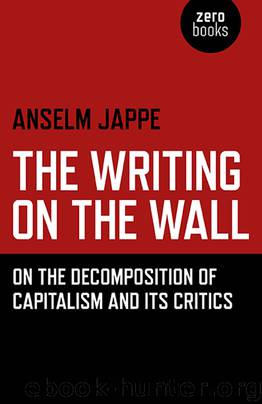The Writing on the Wall by Anselm Jappe

Author:Anselm Jappe [Jappe, Anselm; Hemmens, Alastair]
Language: eng
Format: epub
ISBN: 978-1-78535-582-0
Publisher: John Hunt (NBN)
Published: 2017-09-29T04:00:00+00:00
What conclusions does the critique of value draw from these considerations? There can be no question of demanding wages for “housewives”, because this would mean that only what is represented in a commodity value and therefore in money continues to be accorded social importance. Nor should the mere positive valorisation of this dissociated “dark side” be undertaken in the name of “difference”. Likewise, it would appear difficult to organise a sphere of the gift alongside the commodity sphere:18 what drives capital to conquer ever more spheres of valorisation is its internal dynamic and not the evil intentions of its managers, who could be tamed by political means. Capital will never be able to peacefully “live with” a sphere of the gift and of gratuity. The critique of value is well aware that there are social relations distinct from the exchange of equivalents and contractual relations that operate even within capitalist society. Nevertheless, it asserts that the emancipatory potential of these forms of relations can only be realised at the cost of an overall break with abstract labour as a form of autonomised and fetishistic social mediation. It is not therefore a question of complaining about some kind of “ungratefulness” on the part of the commodity system, which does not, for example, sufficiently acknowledge “business cooperation”. Perhaps, as Polanyi claims, reciprocity, redistribution and local markets could have coexisted in pre-capitalist societies; but the fully developed unregulated market—in which the transformation of labour into money and, as a result, the proliferation of abstract labour, becomes the sole purpose of social life—must destroy all other means of exchange, which in turn cannot be restored except at the price of a generalised transcendence of the concrete world’s subjection to its commodity form.
In conclusion, the critique of value and gift theory are among the forms of thought that pay most attention to one of the most dangerous aspects of the contemporary world: an increasing number of individuals and groups are becoming “superfluous” because they are “useless”. “Useless” from the point of view of utilitarianism and “useless” from the point of view of the valorisation of value. “In a society based on the duty to be useful, there is nothing worse than the sense of being superfluous”, says Alain Caillé,19 speaking of totalitarian regimes. But is it not the totalitarianism of commodity logic, based on labour, which is currently making increasingly large strata of humanity superfluous, and ultimately humanity itself? Is it even possible, without referring to the lethal rule of abstract value and abstract labour, to explain the fact that individuals have become perfectly interchangeable: an interchangeability that would form the link between utilitarianism and totalitarianism? In the absence of such a reference, is it possible to grasp the reductio ad unum that for utilitarians means all pleasures are comparable and therefore the same, being distinguishable only quantitatively, to the point that “the pleasure of listening to J. S. Bach” is no different from “the pleasure of eating a camembert”?20
Download
This site does not store any files on its server. We only index and link to content provided by other sites. Please contact the content providers to delete copyright contents if any and email us, we'll remove relevant links or contents immediately.
International Integration of the Brazilian Economy by Elias C. Grivoyannis(57288)
The Radium Girls by Kate Moore(10902)
Turbulence by E. J. Noyes(7032)
Nudge - Improving Decisions about Health, Wealth, and Happiness by Thaler Sunstein(6629)
The Black Swan by Nassim Nicholas Taleb(6184)
Pioneering Portfolio Management by David F. Swensen(5599)
Rich Dad Poor Dad by Robert T. Kiyosaki(5140)
Zero to One by Peter Thiel(4817)
Man-made Catastrophes and Risk Information Concealment by Dmitry Chernov & Didier Sornette(4728)
Secrecy World by Jake Bernstein(3773)
Millionaire: The Philanderer, Gambler, and Duelist Who Invented Modern Finance by Janet Gleeson(3565)
Skin in the Game by Nassim Nicholas Taleb(3456)
The Age of Surveillance Capitalism by Shoshana Zuboff(3411)
The Money Culture by Michael Lewis(3276)
Skin in the Game: Hidden Asymmetries in Daily Life by Nassim Nicholas Taleb(3259)
Bullshit Jobs by David Graeber(3173)
The Dhandho Investor by Mohnish Pabrai(3161)
The Wisdom of Finance by Mihir Desai(3069)
Blockchain Basics by Daniel Drescher(2884)
